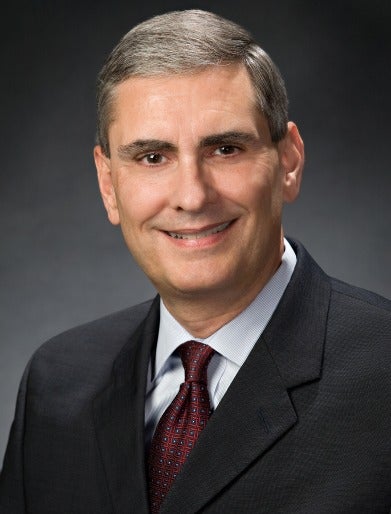Title: Pennsylvania Higher Education Chancellor to Chair D.C. Higher Ed Consortium
John C. Cavanaugh, chancellor of the Pennsylvania State System of Higher Education (PASSHE), has been tapped to lead the Consortium of Universities of the Washington Metropolitan Area.

John C. Cavanaugh will lead the 14-member Consortium of Universities of the Washington Metropolitan Area.
John C. Cavanaugh, chancellor of the Pennsylvania State System of Higher Education (PASSHE), has been tapped to lead the Consortium of Universities of the Washington Metropolitan Area.
Cavanaugh, who has served as PASSHE chancellor since 2008, will begin leading the consortium of 14 D.C. area universities and colleges in March. He replaces John Childers, who is retiring in January.
Private and public higher education institutions in the Washington, D.C. area created the consortium, a nonprofit association committed to the advancement of higher education in the region, in 1964.
Wealth of Experience
“The depth of experience John brings to the consortium will help us to strengthen the relationship between our region’s institutions of higher education and enhance the collective impact we can make in our city,” says Georgetown President John J. DeGioia, the current chair of the consortium. “As we work to maximize the role of higher education in growing and supporting our local economy, we are fortunate to have John in this leadership position.”
DeGioia and American University President Neil Kerwin, who will become chair of the consortium in academic year 2013-2014, led a national search to fill the position, working together with other consortium member presidents.
“I look forward to the opportunity to work with these 14 outstanding institutions,” Cavanaugh says. “The consortium goal is to play a central a role in the future of the nation’s capital, both through its economic impact and in shaping policy affecting all of higher education.”
Economic Impact
According to a 2011 study commissioned by the consortium, the higher education sector, the largest private employers in the District, collectively add $11.3 billion to the regional economy each year.
Together the consortium universities and colleges support almost 200,000 jobs in the region.
The study also noted that area college students provide more than 600,000 hours of public service annually to the Washington, D.C. area community.
Focused Leadership
During his tenure as chancellor, Cavanaugh worked closely with the board of governors and the university presidents to place renewed focus on student learning and success. His leadership of the system focused on its commitment to remain the most affordable, four-year higher education opportunity in the state.
Under Cavanaugh’s leadership, the system developed a series of bills, unanimously adopted by the General Assembly and signed by Pennsylvania Gov. Tom Corbett, to provide the universities with new competitive and cost-savings opportunities. The bills also granted the universities to offer advanced degree programs designed to meet the needs of local and regional employers in Pennsylvania.
Points of Pride
“It has been an honor to work with a dedicated board of governors, our highly talented university presidents, the councils of trustees, faculty and staff to provide our students with an outstanding educational experience,” Cavanaugh said. “Together we share many points of pride – a focus on affordability, the wonderful students who are the reason we come to work each day, and our strong relationships with the coalitions we developed to make an impact for the students of our state.”
The chair of the PASSHE board of governors, Guido Pichini, lauded Cavanaugh for his years as chancellor.
“As chairman of the PASSHE board of governors I join my fellow board members in wishing the chancellor great success in his new endeavor,” Pichini said. “All of us in the system, and most importantly our almost 115,000 students, have benefited from his efforts to bring new ideas and high standards to all we do.”
Higher Ed Leadership
From 2002 to 2008, Cavanaugh served as president of the University of West Florida in Pensacola. Among his accomplishments was the creation of the Academic Technology Center, an internationally recognized teaching-learning faculty development center.
In addition, under Cavanaugh’s leadership, the university was one of the original proponents of the Vince Whibbs Community Maritime Park, the largest public-private partnership in Pensacola history.
He served as provost and vice chancellor for academic affairs at the University of North Carolina at Wilmington from 1999 to 2002.
Cavanaugh has served on numerous national and regional boards, most recently elected to the Pinnacle Health Systems’ board of directors, the Council for Adult and Experiential Learning (CAEL) board of trustees and the American Association of State Colleges and Universities (AASCU) board of directors.
He also served on the board of directors of Marygrove College, a Catholic institution in Detroit, from 2000-2009 and from 2010 to the present.
Educational, Personal Background
Cavanaugh attended St. Joseph’s in Philadelphia before earning a bachelor’s degree in psychology with high honors from the University of Delaware in 1975.
He also holds both a master’s degree and a Ph.D. in psychology from the University of Notre Dame, and served as a postdoctoral fellow at the University of Minnesota’s Center for Research in Human Learning and the Institute of Child Development.
He is married to Christine K. Cavanaugh, with whom he collaborates on issues in higher education and gerontology.
Members of the Consortium of Universities of the Washington Metropolitan Area:
American University
The Catholic University of America
Corcoran College of Art + Design
Gallaudet University
George Mason University
The George Washington University
Georgetown University
Howard University
Marymount University
National Intelligence University
National Defense University
Trinity Washington University
University of the District of Columbia
University of Maryland